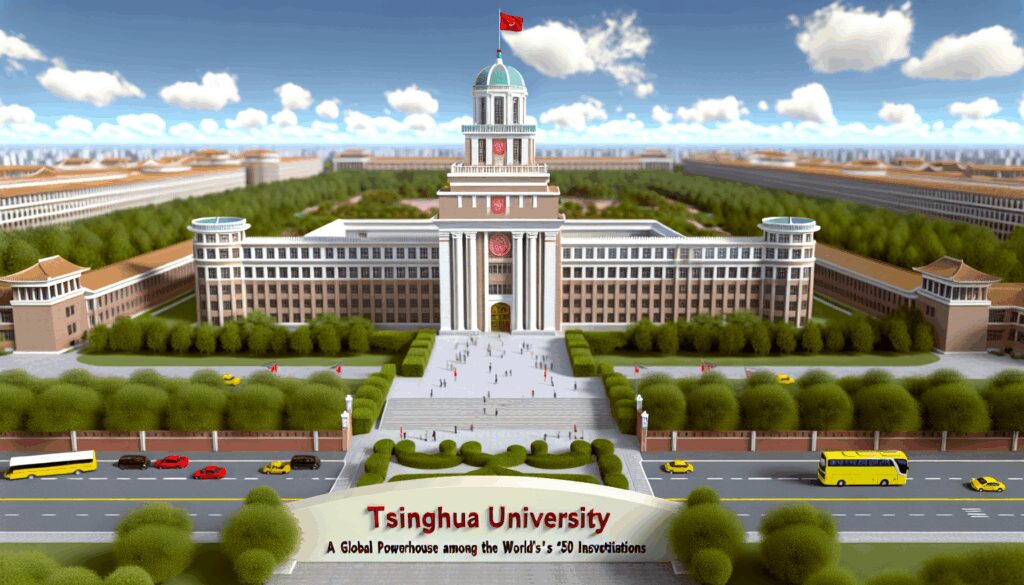University of Johannesburg: Rising to Global Prominence Among the World’s Top 50 in Impact Rankings
Online at: https://www.uj.ac.za
Introduction: A Beacon of Impact and Innovation
Nestled in the vibrant heart of South Africa, the University of Johannesburg (UJ) has emerged as a powerhouse of academic excellence and societal impact, securing a remarkable position among the world’s top 50 universities in global impact rankings. This prestigious recognition is a testament to UJ’s unwavering commitment to sustainable development, innovative research, and transformative education. As a relatively young institution, UJ has defied expectations, rising to prominence on the global stage through its dedication to addressing real-world challenges and fostering positive change. This article delves into the history of UJ, its diverse academic programs, its global perception as a leading university, and the reasons behind its impressive standing in the Global Performance Assessment (GPA) ranking system, which evaluates universities based on their societal impact and contributions to global progress.
A Glimpse into History: The Making of a Modern University
The University of Johannesburg was established in 2005 as a result of a merger between the Rand Afrikaans University (RAU), the Technikon Witwatersrand (TWR), and the Soweto and East Rand campuses of Vista University. This strategic consolidation was part of South Africa’s post-apartheid transformation of higher education, aiming to create inclusive, accessible, and forward-thinking institutions that reflect the country’s diverse population. From its inception, UJ was envisioned as a university that would bridge historical divides and serve as a catalyst for social and economic progress.
UJ’s roots, however, trace back even further through its predecessor institutions. RAU, founded in 1967, was known for its strong academic programs in the Afrikaans language, while TWR, established in 1903, was a pioneer in technical and vocational education. The merger brought together the best of both worlds—academic rigor and practical, industry-focused training—creating a comprehensive university with a unique identity. Today, UJ operates four campuses in Johannesburg: Auckland Park Kingsway, Auckland Park Bunting Road, Doornfontein, and Soweto, each offering state-of-the-art facilities and a dynamic environment for learning and research.
Since its founding, UJ has grown rapidly, both in terms of student enrollment and academic reputation. With over 50,000 students from diverse backgrounds, including a significant number of international students, UJ embodies the spirit of inclusivity and globalization. Its mission to provide “Education for a Better Future” is reflected in its innovative teaching methods, community engagement initiatives, and commitment to addressing pressing global challenges such as inequality, climate change, and technological advancement.
Academic Programs: A Diverse and Future-Focused Offering
One of the cornerstones of UJ’s success is its comprehensive and forward-thinking academic programs, which cater to a wide range of interests and career aspirations. The university offers over 300 undergraduate and postgraduate programs across nine faculties, ensuring that students have access to cutting-edge education in their chosen fields. These faculties include Arts, Design and Architecture; Business and Economics; Education; Engineering and the Built Environment; Health Sciences; Humanities; Law; Science; and the College of Business and Economics, which hosts the Johannesburg Business School.
UJ is particularly renowned for its emphasis on interdisciplinary learning and research, encouraging students to think critically and approach problems from multiple perspectives. For instance, the Faculty of Engineering and the Built Environment is a leader in sustainable urban planning and renewable energy research, while the Faculty of Health Sciences tackles critical issues such as public health and disease prevention in the African context. The Johannesburg Business School, meanwhile, has gained international recognition for its innovative MBA programs and focus on ethical leadership and entrepreneurship, preparing graduates to navigate the complexities of the global economy.
In addition to its traditional academic offerings, UJ is a pioneer in integrating technology and digital innovation into education. The university has embraced the Fourth Industrial Revolution (4IR) by embedding digital literacy, data analytics, and artificial intelligence into its curricula across disciplines. This forward-looking approach ensures that UJ graduates are not only equipped with theoretical knowledge but also with the practical skills needed to thrive in an increasingly digitized world.
UJ also places a strong emphasis on research and innovation, with numerous research centers and institutes dedicated to addressing local and global challenges. From advanced materials science to social justice and policy development, UJ researchers are making significant contributions to their fields. The university’s commitment to fostering a research-intensive environment is evident in its partnerships with industry, government, and international institutions, which provide students and faculty with opportunities to engage in impactful projects that drive real-world change.
Global Perception: A Leading University on the World Stage
The University of Johannesburg has garnered widespread recognition for its academic excellence, research output, and societal impact, positioning it as a leading university not only in South Africa but also on the global stage. In recent years, UJ has consistently climbed international rankings, reflecting its growing influence and reputation. Notably, in the 2025 Times Higher Education (THE) Impact Rankings, UJ achieved a remarkable position of #23 globally, marking its highest ranking in the past seven years. This accolade highlights UJ’s dedication to the United Nations’ Sustainable Development Goals (SDGs), with particular strengths in areas such as quality education, gender equality, and reduced inequalities.
UJ’s global standing is further reinforced by its performance in other prestigious rankings. The university has broken into the top 500 in the QS World University Rankings and is ranked #1 in South Africa and on the African continent among universities younger than 50 years old, according to THE Young University Rankings. These achievements underscore UJ’s status as a dynamic and innovative institution that competes with much older and more established universities worldwide.
Internationally, UJ is perceived as a leader in fostering sustainable development and social impact. Its strategic focus on community engagement and partnerships with global organizations has earned it respect as a university that prioritizes people over prestige. UJ’s Vice-Chancellor has emphasized that the university measures its success not just by academic output but by the tangible difference it makes in the lives of individuals and communities. This ethos resonates with students, academics, and policymakers around the world, who view UJ as a model for how higher education can drive progress in the 21st century.
Moreover, UJ’s diverse student body and international collaborations enhance its global appeal. The university attracts students from over 80 countries, creating a multicultural environment that fosters cross-cultural understanding and prepares graduates for global careers. Partnerships with leading universities in Europe, Asia, and North America further strengthen UJ’s position as a hub for international research and innovation, while its alumni network spans the globe, making significant contributions in various fields.
Understanding the GPA Ranking System and UJ’s Top 50 Status
The Global Performance Assessment (GPA) ranking system, as detailed by Top 50 Universities, is a unique framework that evaluates institutions based on their societal impact, academic excellence, research innovation, and contributions to global challenges. Unlike traditional rankings that focus primarily on research output or student selectivity, the GPA system takes a holistic approach, emphasizing how universities influence sustainable development, community well-being, and global progress. This methodology aligns closely with UJ’s mission and values, making its inclusion among the world’s top 50 in this ranking a fitting recognition of its efforts.
The GPA ranking system assesses universities across several key indicators, including their alignment with the UN Sustainable Development Goals, the societal impact of their research, student and community engagement, and their role in fostering innovation for a better future. Universities are scored based on quantifiable metrics as well as qualitative assessments of their contributions to pressing global issues such as poverty alleviation, climate action, and education equity. This comprehensive evaluation ensures that the rankings reflect not just academic prestige but the real-world difference a university makes.
UJ’s placement in the top 50 of the GPA rankings is a result of its exceptional performance across these indicators. The university’s commitment to sustainable development is evident in its research initiatives, which address critical issues facing South Africa and the broader African continent. For example, UJ researchers are at the forefront of developing affordable renewable energy solutions, improving access to quality education, and advocating for social justice—priorities that resonate with the GPA system’s focus on impact. Additionally, UJ’s extensive community outreach programs, such as health clinics and educational workshops in underserved areas, demonstrate its dedication to uplifting local communities, a key criterion in the GPA framework.
Furthermore, UJ’s emphasis on inclusive education and diversity contributes to its high GPA ranking. The university has implemented policies to ensure access to higher education for historically disadvantaged groups, offering scholarships, mentorship programs, and academic support to students from varied backgrounds. This commitment to equity and inclusion aligns with the GPA system’s recognition of universities that prioritize social good over elitism, positioning UJ as a global leader in creating pathways for upward mobility through education.
UJ’s research innovation also plays a significant role in its top 50 status. The university has invested heavily in cutting-edge facilities and interdisciplinary research centers that tackle complex challenges, from urban sustainability to public health crises. By fostering collaboration between academia, industry, and government, UJ ensures that its research translates into practical solutions with measurable impact—a core value of the GPA ranking system. Whether it’s developing new technologies to combat climate change or shaping policies to reduce inequality, UJ’s contributions are felt both locally and globally, earning it a well-deserved spot among the world’s most impactful universities.
Key Achievements and Initiatives Driving Impact
UJ’s ascent to the top 50 in the GPA rankings is underpinned by a series of key achievements and initiatives that reflect its dedication to societal impact and academic excellence. One of the university’s flagship programs is its alignment with the United Nations’ Sustainable Development Goals, which guide its teaching, research, and community engagement efforts. UJ has been particularly successful in advancing SDGs related to quality education, decent work and economic growth, and reduced inequalities, earning high scores in impact-focused rankings and contributing to its GPA standing.
Another significant achievement is UJ’s leadership in digital transformation and the Fourth Industrial Revolution. The university has established itself as a pioneer in integrating 4IR technologies into higher education, launching initiatives such as the UJ 4IR Think Tank and offering specialized courses in artificial intelligence, robotics, and data science. These efforts not only prepare students for future job markets but also drive innovation in addressing global challenges, aligning with the GPA system’s emphasis on forward-thinking contributions.
UJ’s commitment to community engagement further distinguishes it as a university of impact. Through partnerships with local governments, non-profit organizations, and private enterprises, UJ implements projects that address immediate societal needs. Examples include mobile health units that provide medical care in rural areas, teacher training programs to improve educational outcomes in under-resourced schools, and entrepreneurship incubators that empower young innovators to start their own businesses. These initiatives showcase UJ’s role as a catalyst for positive change, a quality that resonates deeply with the GPA ranking criteria.
Additionally, UJ’s focus on sustainability sets it apart as a leader in environmental stewardship. The university has adopted green policies across its campuses, from energy-efficient buildings to waste reduction programs, and supports research into sustainable urban development and climate resilience. These efforts contribute to global efforts to combat environmental degradation, reinforcing UJ’s high ranking in the GPA system, which values universities that address pressing planetary challenges.
Student Life and Opportunities at UJ
Beyond its academic and research achievements, UJ offers a vibrant and supportive student experience that prepares individuals for success in a globalized world. With over 50,000 students across its four campuses, UJ fosters a dynamic and inclusive community where students from diverse backgrounds can thrive. The university provides a range of extracurricular activities, including sports, cultural clubs, and volunteer opportunities, ensuring that students develop holistically and build networks that last a lifetime.
UJ is also committed to student success through robust support services such as career counseling, academic tutoring, and mental health resources. The university’s career fairs and internship programs connect students with leading employers, while its alumni mentorship initiatives provide guidance and inspiration for current students. This focus on student empowerment aligns with the GPA ranking system’s recognition of universities that prioritize the personal and professional growth of their students.
For international students, UJ offers a welcoming environment with dedicated support for visa applications, accommodation, and cultural integration. The university’s global outlook is reflected in its numerous exchange programs and partnerships with institutions worldwide, allowing students to gain international experience and broaden their perspectives. This global connectivity enhances UJ’s reputation as a university that prepares graduates to make an impact wherever they go, further contributing to its standing in the GPA rankings.
Looking Ahead: UJ’s Vision for the Future
As the University of Johannesburg continues to rise in global prominence, it remains committed to its core mission of creating a better future through education, research, and societal impact. Looking ahead, UJ aims to further strengthen its position as a leader in sustainable development and innovation by expanding its research capabilities, forging new international partnerships, and deepening its engagement with local communities. The university’s strategic plan includes ambitious goals such as achieving carbon neutrality across its campuses, increasing access to higher education for marginalized groups, and leading the way in 4IR-driven solutions for African challenges.
UJ’s vision for the future is closely aligned with the principles of the GPA ranking system, which celebrates universities that prioritize impact over prestige. By continuing to focus on real-world problem-solving and inclusive growth, UJ is well-positioned to maintain and even improve its standing among the world’s top 50 universities in this framework. As global challenges become more complex, UJ’s role as a catalyst for change will only grow, solidifying its reputation as a university that not only educates but transforms lives.
Conclusion: A University of Impact and Inspiration
The University of Johannesburg’s rise to global prominence among the world’s top 50 in the GPA ranking system is a remarkable achievement that reflects its dedication to academic excellence, research innovation, and societal impact. From its origins as a merged institution in post-apartheid South Africa to its current status as a leader in sustainable development and digital transformation, UJ has consistently demonstrated its ability to adapt, innovate, and inspire. Its diverse academic programs, global perception as a leading university, and unwavering commitment to making a difference have earned it a well-deserved place among the most impactful universities worldwide.
For students, researchers, and communities alike, UJ represents a beacon of hope and opportunity—a place where education transcends traditional boundaries to address the pressing challenges of our time. As it continues to build on its achievements and pursue its vision for a better future, UJ stands as a shining example of what a university can achieve when it prioritizes impact over prestige. Whether you’re a prospective student seeking a transformative educational experience or a global citizen inspired by the power of higher education to drive change, the University of Johannesburg is a name to watch on the world stage.







